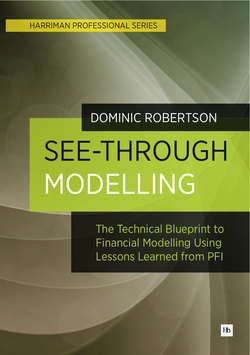Читать книгу See-Through Modelling - Dominic Robertson - Страница 85
На сайте Литреса книга снята с продажи.
2. Design (D)
ОглавлениеThe design of a model is about the structure, organisation and choice of logic. So model design is also about the choice of formulae. For a project finance company in operations there is limited design left to do given the sheer quantity of projects out in the market. In other words, there is a clear template that can be used.
However, there will always be occasions when some further design is necessary to overcome particular difficulties. These might arise from projects with more complicated operations, such as waste water projects. Or they might arise from more complicated finances, with more tranches of junior debt, such as mezzanine finance. Essentially the model is a pragmatic expression of a series of contracts between various parties and the project company. So design also means the nitty-gritty logic that describes these contracts.
There is good design and bad design.
Good design:
achieves the objectives in an elegant and transparent solution
knows its limitations – it is not the intention to build a model that can withstand a 100-year storm
flags errors and requires further design later as required
employs clear organisation and structure
has no duplication or repetition
minimises logical counter flows
minimises the number of reports
understands the importance of model maintenance for the success of a model
above all, is simple.
Bad design:
is over-complicated logic
is massive formulae
is changing timelines on the same sheet
is disorganised and has a lack of structure
is repetitive and duplicative
has no respect for hierarchy
creates endless rehashed versions of the financial statements that will require constant maintenance, and
is the use of un-auditable formulae like OFFSET.
